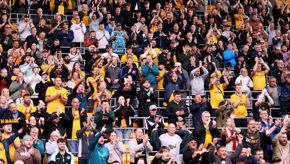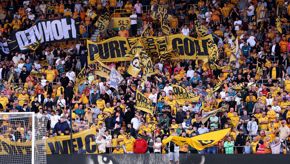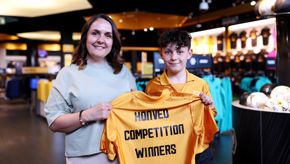A host of new faces were welcomed on Wednesday night at the first meeting of the season of the Wolves Fans’ Parliament.
Chief Executive Jez Moxey said the initiative remained something the club were very proud of and was one that might soon be repeated elsewhere in the country, with two Premier League clubs having asked for advice on its setting up.
Tom Bate, a secondary school teacher from Derby, was asked to speak briefly about his two years’ membership to date and told newcomers they would enjoy their time on board. “You really do feel part of the inner workings of the club,” he said. “General issues that affect large groups of people go down well. We’re not Moxey’s Puppets. We just have one thing in common, a passion for this great club.”
One of the new members, Dave Benton, said he thought more attention should be paid to the preparation of an agenda because it would be useful to have chance to prepare for meetings.
Clearing up outstanding business from previous minutes, Parliament Chairman Matt Grayson said Darren Cash had asked about the sight lines for wheelchair users in the Billy Wright Stand lower. Head of Ticketing and Membership Lynne O’Reardon said Darren had now been relocated and the club were aware there were other issues regarding the front row of that stand. “We have removed from sale some seats that are affected,” she said.
Matt also said that the goal celebration music which John Meaney had described as ‘inappropriate’ had been stopped.
Rita Purewal, the club’s Financial Controller for many years, was the central figure at the first half of the meeting as she outlined the financial results – the one taking in the year ending on May 31, 2012. She said the figures were being published earlier than usual because of the new Financial Fair Play regulations affecting Championship clubs.
She said the results demonstrated the club were operating on a sound financial footing, with a turnover of £60.6m compared with £64.4m the previous year. The reduction was partly due to lower Premier League merit receipts and lower match-day revenue. Attendances had decreased from 27,695 to 25,670 and were slightly affected by lower capacity because of the stadium redevelopment.
The club posted a pre-tax profit of £2.16m after player trading and net interest compared with £2.24 in 2011. The information didn’t include the sales of Steven Fletcher, Matt Jarvis and Michael Kightly, nor the recruitment of seven new players. Operating costs were on a par with the previous season but player payroll was higher than the previous year after bonus payments were considered and the club had signed new four players in Jamie O’Hara, Roger Johnson, Dorus De Vries and Eggert Jonsson.
Rita also told the meeting that a number of players had signed extended contracts and the club had a strong balance sheet with net assets totalling £74.9m – a figure that included Molineux and the training ground.
She said first-class new amenities had been provided over the year with the rebuilding of the Stan Cullis Stand while considerable improvements had been carried out at Compton, with the club’s Academy achieving Category One status.
Jeff Bagnall asked about the press reports suggesting the club supposedly failed to pay due tax and was told by Jez Moxey: “It’s complete and utter rubbish, poor journalism. Somebody jumped on the bandwagon as a result of the publicity surrounding Starbucks, Google and Amazon. Not many clubs make a profit, so they (the press) picked on the five or six who do. If a trading entity makes a £10m loss one year and then a £10m profit the next, there’s no Corporation Tax to pay because one offsets the other. It was very sloppy, poor journalism and that’s one of the challenges we face….clubs are very easy targets. But I can say we actually make huge tax payments to the Exchequer.”
Simon Wade asked if the £30m pledged by Steve Morgan when he took over the club five years ago went into the holding company and was told by Rita that it had. Jez said it was new share capital, adding: “The spirit of Sir Jack Hayward’s approach to running the club has been picked up and continued by Steve. We turned down people (before Steve) who went on to buy other big football clubs and who are no longer involved with them. Sir Jack wanted someone to do it the right way and who had the right resources.”
To a question from Dave Benton, Rita said the holding company was UK-based and not offshore. Clive Smith pointed out that fans grew nervous about such financial stories as this one concerning tax because they dreaded Wolves being the next Portsmouth.
Steve Phillips enquired how much of the near-£75m net assets was liquid and how much was tied up in bricks and mortar. Rita said about £71m was fixed assets, of which almost £50m was in bricks and mortar. She then went on to add that the balance sheet did not reflect the true worth of the players’ valuations and that one none of the home grown players were included in the asset base even though some of them have a significant value in the market place.
Greg Asbury asked: “Is it possible to say how much of the £30m (from Steve) is left?” Jez said: “No, it’s too complicated but we’ve spent a lot of money. People tell us to speculate to accumulate and it’s a little concerning that we make only a £2m profit on a £60m turnover in the Premier League. It’s difficult getting the balance right. Continuing to invest in the future of Wolves is our priority but we’re not getting into what money we have. It’s commercially sensitive.”
Mark Griffiths asked what the impact on the assets was of the new stand and was told by Rita: “The cost of the stand was about 20m. We have to revalue the stadium at the end of this year, so there’s an increase in the asset base of between £19m and £20m.” Jez pointed out that the stand was built to give fans ‘the very best facilities’ and with the aim of creating the best possible atmosphere to help the team win more games. “There’s no commercial argument for building that stand,” he summed up. “But Steve Morgan had said years ago that the stands were too far away from the pitch, so we moved it seven metres closer to the Jack Harris Stand and made room for this magnificent new stand to be built.”
Tom Bason asked Rita whether there was a worry Wolves would miss out on the new TV deal next season if they failed to win promotion in 2012-13. She replied: “We will still get a bite of the cherry and see an increase in parachute payments” but Jez added: “We’re very conscious that the only way this works is in the Premier League. It’s very hard to make it work financially in the Championship.” Jeff Bagnall said: “I’ve been to every game for the last three seasons, home and away, and I haven’t been in any stand that compares with that one. It’s fabulous.”
Mark Griffiths requested an explanation as to what the Fair Play regulations were meant to achieve? Rita said it was to encourage clubs to spend within their means and cut their cloth accordingly. “The first two years will be just on a monitoring basis to make sure you’re heading in the right direction,” she said. “Then, if you breach regulations, there will be sanctions such as a transfer embargo.”
Greg Asbury asked what drop in revenue was shown on the balance sheet and was told by Rita: “That from central funds is the biggest. There has been a £25m drop just on that element.” Dave Benton asked how that was going to be made up and wondered whether the club were looking to drop players’ wages. Jez answered: “There is a significant drop in the player wage bill anyway. It’s written into their contracts (in the event of relegation) and every one of us is incentivised for help the club to stay in the Premier League. But it’s very difficult to make up that deficit – any business would struggle with an immediate drop of, say, over 40% in turnover.”
Paul Richards introduced himself as the club’s Supporter Liaison Officer (a position he has held since April) and said the biggest development he had helped oversee was the setting-up of the Disabled Supporter Association at the club. “We canvassed 200 fans and got it off the ground,” he said “We have a really strong association and have had an AGM. It’s a massive step forward in a short space of time. These fans have a stronger bond with the club and it’s self-funding.” Matt Grayson said the move was ‘natural progression.’ “We have had a really productive relationship with these supporters, more so through the discussions over redevelopment,” he said. “DSA is independent of the football club.”
FOOTBALL ISSUES
Jez Moxey kicked off this section of the meeting by saying: “There’s a myth that we’re trying to save money, spend as little as possible just to make a profit. I want us firmly in the Premier League, competing as high as we can, and we do that by investing in managers, players, scouts, coaches, sports science, medical support etc. We have a training ground that’s as good as any in the country if not as big. We all benefit if we are in the Premier League. My total motivation is to help get us up without bankrupting us in the process; to run a tight, well-respected ship. I live sleep and breathe Wolverhampton Wanderers. How we get there is the difficult bit.”
Dennis Green said he was concerned by the players’ apparent lack of fitness in the latter part of games. “We seem to be a 60-minute team and run out of steam,” he said. Jez replied: “The manager or Tony Daley would completely dispute that but we’re playing a completely different style and it may look as if that’s the case. Clearly it’s not right……at the moment we’re not doing what we had expected to. The players are adjusting to a new division, a new playing style – games Saturday, Tuesday – and one or two players didn’t have a Wolves pre-season. Players wear a GPS monitors for every training session, and the data we produce from that is to a recognised British standard – we were the first club to gain laboratory accreditation from BASES (British Association of Sport and Exercise Science). The players are no less fit than last season. It’s more about the style of play and momentum or a lack of.”
Chris Bate asked whether Stale Solbakken had had the opportunity to bring in his own backroom staff and was told by Jez: “After a period of time, he would have been able to make that kind of decision. Rightly or wrongly, we believe a manager shouldn’t change everything in a football club.” Chris went on to ask whether Terry Connor had not gone earlier because the manager wasn’t able to make the change. Jez denied that, saying: “Every manager who came in thought Terry was brilliant at what he did here. And that’s why Mick McCarthy has taken him to Ipswich. The players love him. They think he was brilliant. Let’s not forget that this six or seven years has been as good to Wolves and their fans as any spell for decades. If managers want to make changes, fine – and that’s what happened to Terry.”
Tony Pickford wondered whether the club had let Tongo Doumbia down in some way. “Is he homesick?” he asked. Jez replied: “Absolutely not, we haven’t let him down. We’re giving him every support, through English lessons etc. Sako and Boukari speak good English and so does Zubar. Jelle Van Damme seemed nailed on as a player with a brilliant physique and speaking perfect English, but he was homesick.”
Hilary Clews said: “The saddest thing about last season was the deterioration between the fans and the club, so, when you get statements about mental fatigue, there would be more understanding if it were said to be homesickness. Mental fatigue doesn’t sit well.” Jez responded: “Even star players are human beings like every one of us. I don’t think we’re sympathetic because we think they should be like soldiers. Not once has Doumbia’s situation been described to me as homesickness.” Julian Dent pointed out: “It was said he had hit the fitness wall.” Jez asked why Hilary thought there had been deterioration and was told there had been a breakdown and everyone you spoke to seemed to have a different opinion as to why.
Keith Bickley referred to the handling of Mick McCarthy’s departure and the subsequent appointment of Terry Connor, followed by more poor results. Steve Galloway said: “Last season was poor on and off the pitch……there were a lot of things round the club. Those changes affected people’s mentality.” Jez said: “We can sugar-coat this as much as we want but if things had been better on the pitch, everything would have seemed better. Football success or otherwise is the main issue.” Tony Pickford added: “Forget the whistles and bells – it’s what happens on that piece of green grass that dictates whether we come here.”
Kevin Groombridge said he had a great deal of regard for Mick McCarthy but that there had been a catastrophic error in trying to replace him – ‘and that’s the view of a lot of people I know.’ He also said he was troubled by speculation in the press over possible successors to the current manager, including the appearance of Alex McLeish’s name recently. Jez told him: “The media want to control the agenda and they are very powerful. There were times in Mick’s reign when he was under a lot of pressure and I think we did exceptionally well in protecting him when it could have got out of control. We aren’t a club that inherently believes in hiring and firing.” To a question from Steve Parkes about what had been learned for next time, the Chief Executive continued: “I’ve very pleased with Stale. Given time and support and if he has a bit of luck and all managers need some luck, the future is bright but we’re still carry a scarred from last season.” Mark Griffiths enquired whether it had been a knee-jerk reaction to sack Mick after the defeat to Albion? “Mick had served us so well, so we weren’t prepared to line up a manager behind his back. Call it naïve but we call it loyalty. We had, and still have, integrity. It wasn’t knee jerk because we had been on a terrible run.”
Keith Wade said he believed Wolves had invested pretty heavily for a Championship club and thought the meeting might have been more spiky had the side lost on Saturday. “The supporters are still with Stale,” he said. “But where is the expectation level this season? Are we happy to take a season of consolidation?” Jez answered: “The ambition is to get promoted as quickly as possible. We don’t subscribe to not being ready to go up. We’re eight points away from the play-off positions. The League table looks bloody horrible to me but there’s no need to panic.”
Steve Phillips pointed out that Jez had said things would get worse before they got better and was told: “I did say that. We’ve been at a low ebb and one win in ten doesn’t mean much apart from a confidence booster for everyone. But we’re resolute in what we believe: To get there as quick as we can. We have new players trying to get used to the Championship. It takes time but we remain optimistic.”
Changing tack, Julian Dent asked: “Can’t you ban players from using Twitter for comments about the club?” Jez said he never believed in banning players from speaking to the media. “We want them to stand up and be counted,” he said. “I want them to be able to take responsibility and take some criticism too and be able fight their corner.” Matt Grayson pointed out that the club had nearly 50,000 followers on Twitter, which never replaced actually meeting fans and shaking hands with them but was nevertheless another way of interacting. “It’s education (about how they should use it) more than anything,” he said. Hilary Clews argued: “With position and money comes responsibility…..we couldn’t tweet about our jobs. Some of it is insensitive.” Matt said Karl Henry had recently used Twitter to apologise for his sending-off against Brighton and the club had re-tweeted that message and seen it picked up by the national press. “Most of the time, it’s good,” Matt summed up. “But it never replaces actually meeting fans.” Kieran Newey said he felt players should be allowed to tweet if they wanted.
Daniel Cartwright asked if Stale would be backed to spend in January. “This club have always spent,” Jez replied. “You can say we might have spent more but we’ve talked about the consequences of relegation and the strains of a drastically reduced revenue stream, so we have to be careful. But I would be disappointed if we weren’t able to do something in January, absolutely. You might see some coming and some going. We have a pretty big squad and have to make some room.”
To a question from Kieran Newey about the possible appointment of a director of football, Jez said this remained on the agenda. “It’s on many clubs’ agendas,” he said. “The reason it was put on hold is that we didn’t want too many moving parts in the summer. Mick had gone and a lot of the heart of the club was therefore changing. We didn’t want to change too much too soon. Let’s get him (Stale) in place first and cement the relationships first. I won’t get drawn on who, when and how.” Julian Dent asked whether a British man would be appointed and Jez said: “Don’t get too hung up on that, it’s more about who can do the job and does the personality fit with the Wolves culture.” To a question from Greg Asbury about signings, Jez said Stale was very much involved in the recruitment of players and his players were being fitted into the new system.
Dave Benton said: “We needed a new voice, someone different – it was obvious we couldn’t keep a clean sheet. We had the second or third lowest wage bill, so it shouldn’t have been a great shock that we went down. Will we do the same again if we go up? If you are rebuilding the team, are we building one to go up and another to do well if we get there? You must have a plan……Stale’s style will suit the Premier League.” Jez’s response was to the point: “Let’s get up first.”
Chris Bate asked whether Stale had only a one-year contract and, if so, whether that meant the club had only a one-year plan. Jez reminded the meeting that Mick McCarthy had also been on a rolling contract and whilst there are plans for the future, he said the immediate plan was always to win the next game.
ANY OTHER BUSINESS:
To a question about fans paying on the door at games these days, Lynne O’Reardon said the club had 850 sales on a match day. “The new ticket office (situated in the old club shop) caters for a pay-on-the-day arrangement,” she said. “It’s just that we can’t exchange cash on the turnstiles any more except in the Steve Bull Stand.”
Tom Bate enquired about where the stadium redevelopment plans stood and asked: “What on earth are we going to do to get more fans in the ground?” Jez said: “Nothing has changed regarding the redevelopment. The way to get more in is to win more games, score more goals and play attractive football.” Tom believed the apathy factor was big in Wolverhampton, stating: “Fans who have been here for decades can’t be bothered any more. “ He was told by the Chief Executive: “That’s our biggest fear. We are creating loads of initiatives but we know relationships have been damaged but believe they can be rebuilt.”
Jeff Bagnall said he had taken up the early-bird offer on the very first option and felt let down. “You open it again after it’s closed, then you ring round. I paid my money four months before the guy next to me. You feel you are better off not having a season ticket. It went sour with people.” Lynne said: “We took a vote on early bird at the Fans’ Parliament (and acted accordingly). Everyone puts us under pressure to have the stadium as full as we can have it.” Frank Parkes said: “Unless you give us a team playing good football, we won’t come.” To an enquiry from Daniel Cartwright about whether away fans could be given more tickets, Lynne said it was generally felt that visiting clubs shouldn’t be given more of an advantage.” Jez chipped in: “The location of away fans here has been discussed a lot. We want to give our team the best advantage to win and that is why we want to locate the visiting fans in the Quadrant as often as possible.”
Kieran Newey addressed the recently opened club museum and said: “A lot of people think £7 is steep for admission. I don’t, especially not for a new purpose-built one. How successful has it been?” Jez responded: “Every fan so far has been open-mouthed when they have gone home. People are staggered by it. To every fan who has the slightest interest in the club, I say: ‘Go and treat yourself, then come back and tell me it’s not worth £7.’ It’s brilliant.” He underlined that it was not expected to be a commercial success and had cost ‘a fortune’ but that is wasn’t designed to make money as some fans had suggested. It was built to showcase all things Wolves and illustrate the club’s great history and the genuine ambitions of this great club. He also challenged back by saying, “I encourage all Parliament members to treat yourselves to a visit to the museum and if at the next meeting you tell me it wasn’t value for money I will personally repay you the £7 entry fee.”
Dave Benton said some fans thought they shouldn’t have to pay £7 as season ticket holders and members. “Why don’t we take it as an opportunity and offer it for nothing or for a couple of quid?” he asked. “Or give visitors a club shop voucher when they go in. Get the kids along, get them interested. They will start buying match tickets then. You could have a facility for fans making voluntary contributions when they complete the tour if you like.” Jez reminded him that the club did have a responsibility to try to secure some revenue. Kieran Newey said it was great that kids were being embraced in the museum idea through school visits. Lesley Matile said had already been round and pointed out how much she enjoyed it.
Finally, Dennis Green asked if more information could be provided for disabled fans on the ticket area of the club website and was promised by Lynne O’Reardon that the matter would be looked at.












